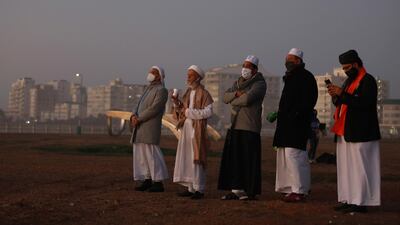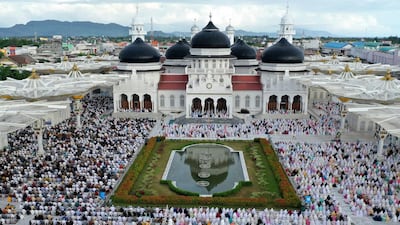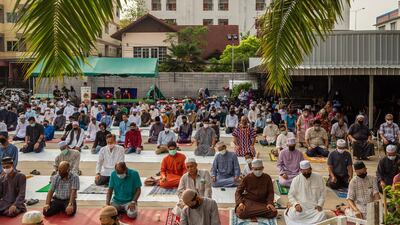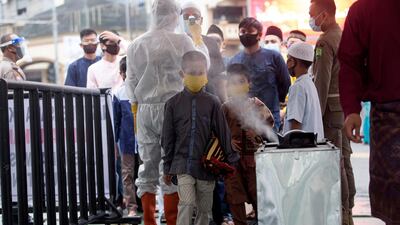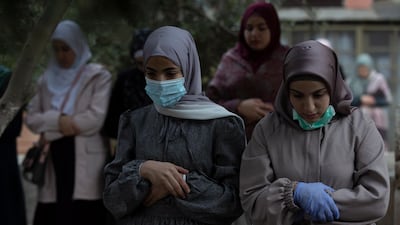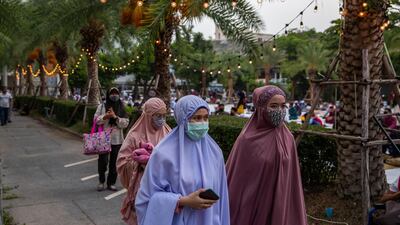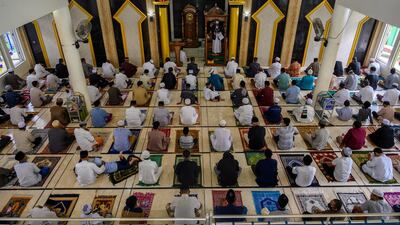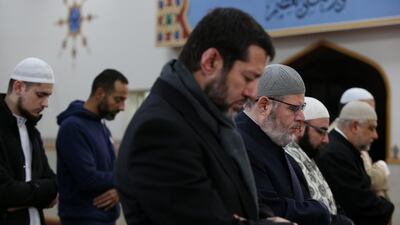As the sun rose on Sunday, instead of hurrying from their homes to their local mosque to perform Eid prayers, many Muslims began the celebration in their living rooms.
The UAE, Bahrain, Kuwait, Oman and Saudi Arabia, among other nations, advised Muslims to pray at home, with some broadcasting sermons and prayers on television and online.
Some countries, including Turkey, Iraq and Jordan, have imposed round-the-clock holiday curfews.
In Sudan, Pakistan and Indonesia, Muslims gathered in squares and outdoor areas to pray together in an attempt to lessen the risk of contracting coronavirus.
Mosques reopened in the Bosnian capital, Sarajevo, but worshippers were required to wear masks and practice social distancing, and older individuals were urged to continue praying at home.
Family visits may have been barred in many Muslim nations, but shopping for Eid gifts was still on the agenda. Shoppers, adhering to social distancing guidelines, thronged malls in Dubai and Abu Dhabi and further afield
Makkah’s Grand Mosque, which would usually be crammed with the faithful for Eid prayers, stood eerily quiet, as a handful of staff prayed around the Kaaba led by an imam.
Saudi Arabia has launched a five-day total curfew over the Eid holiday after coronavirus infections more than quadrupled since the start of Ramadan to over 70,000, leading prayers to be broadcast online.
Just days before the Al Aqsa mosque in Jerusalem was due to reopen as part of the lifting of coronavirus lockdown measures, hundreds gathered to pray outside it.
In Gaza, Hamas authorities allowed prayers in mosques despite the enclave's first coronavirus death on Saturday, but worshippers mostly wore masks and placed their prayer mats far apart.
Afghans experienced a quiet first day of Eid, thanks to the announcement of a three-day ceasefire between the Taliban and the government to mark Eid al-Fitr, following months of bloody fighting after the signing of a landmark agreement with the United States.
Islamophobia definition
A widely accepted definition was made by the All Party Parliamentary Group on British Muslims in 2019: “Islamophobia is rooted in racism and is a type of racism that targets expressions of Muslimness or perceived Muslimness.” It further defines it as “inciting hatred or violence against Muslims”.
Cinco in numbers
Dh3.7 million
The estimated cost of Victoria Swarovski’s gem-encrusted Michael Cinco wedding gown
46
The number, in kilograms, that Swarovski’s wedding gown weighed.
1,000
The hours it took to create Cinco’s vermillion petal gown, as seen in his atelier [note, is the one he’s playing with in the corner of a room]
50
How many looks Cinco has created in a new collection to celebrate Ballet Philippines’ 50th birthday
3,000
The hours needed to create the butterfly gown worn by Aishwarya Rai to the 2018 Cannes Film Festival.
1.1 million
The number of followers that Michael Cinco’s Instagram account has garnered.
CHELSEA'S NEXT FIVE GAMES
Mar 10: Norwich(A)
Mar 13: Newcastle(H)
Mar 16: Lille(A)
Mar 19: Middlesbrough(A)
Apr 2: Brentford(H)
COMPANY%20PROFILE
Kareem Shaheen on Canada
While you're here
Hussein Ibish: America's attitude to Palestine and Israel has subtly shifted
Con Coughlin: With every missile fired in Israel-Gaza, Biden's clout reduces
Anwar Mhajne: The moral burden of being a Palestinian citizen of Israel
On Women's Day
Dr Nawal Al-Hosany: Why more women should be on the frontlines of climate action
Shelina Janmohamed: Why shouldn't a spouse be compensated fairly for housework?
Samar Elmnhrawy: How companies in the Middle East can catch up on gender equality
The National Editorial: Is there much to celebrate on International Women's Day 2021?
The specs: 2018 Nissan Altima
Price, base / as tested: Dh78,000 / Dh97,650
Engine: 2.5-litre in-line four-cylinder
Power: 182hp @ 6,000rpm
Torque: 244Nm @ 4,000rpm
Transmission: Continuously variable tranmission
Fuel consumption, combined: 7.6L / 100km
Other acts on the Jazz Garden bill
Sharrie Williams
The American singer is hugely respected in blues circles due to her passionate vocals and songwriting. Born and raised in Michigan, Williams began recording and touring as a teenage gospel singer. Her career took off with the blues band The Wiseguys. Such was the acclaim of their live shows that they toured throughout Europe and in Africa. As a solo artist, Williams has also collaborated with the likes of the late Dizzy Gillespie, Van Morrison and Mavis Staples.
Lin Rountree
An accomplished smooth jazz artist who blends his chilled approach with R‘n’B. Trained at the Duke Ellington School of the Arts in Washington, DC, Rountree formed his own band in 2004. He has also recorded with the likes of Kem, Dwele and Conya Doss. He comes to Dubai on the back of his new single Pass The Groove, from his forthcoming 2018 album Stronger Still, which may follow his five previous solo albums in cracking the top 10 of the US jazz charts.
Anita Williams
Dubai-based singer Anita Williams will open the night with a set of covers and swing, jazz and blues standards that made her an in-demand singer across the emirate. The Irish singer has been performing in Dubai since 2008 at venues such as MusicHall and Voda Bar. Her Jazz Garden appearance is career highlight as she will use the event to perform the original song Big Blue Eyes, the single from her debut solo album, due for release soon.
Who's who in Yemen conflict
Houthis: Iran-backed rebels who occupy Sanaa and run unrecognised government
Yemeni government: Exiled government in Aden led by eight-member Presidential Leadership Council
Southern Transitional Council: Faction in Yemeni government that seeks autonomy for the south
Habrish 'rebels': Tribal-backed forces feuding with STC over control of oil in government territory
The Gentlemen
Director: Guy Ritchie
Stars: Colin Farrell, Hugh Grant
Three out of five stars
Mercer, the investment consulting arm of US services company Marsh & McLennan, expects its wealth division to at least double its assets under management (AUM) in the Middle East as wealth in the region continues to grow despite economic headwinds, a company official said.
Mercer Wealth, which globally has $160 billion in AUM, plans to boost its AUM in the region to $2-$3bn in the next 2-3 years from the present $1bn, said Yasir AbuShaban, a Dubai-based principal with Mercer Wealth.
“Within the next two to three years, we are looking at reaching $2 to $3 billion as a conservative estimate and we do see an opportunity to do so,” said Mr AbuShaban.
Mercer does not directly make investments, but allocates clients’ money they have discretion to, to professional asset managers. They also provide advice to clients.
“We have buying power. We can negotiate on their (client’s) behalf with asset managers to provide them lower fees than they otherwise would have to get on their own,” he added.
Mercer Wealth’s clients include sovereign wealth funds, family offices, and insurance companies among others.
From its office in Dubai, Mercer also looks after Africa, India and Turkey, where they also see opportunity for growth.
Wealth creation in Middle East and Africa (MEA) grew 8.5 per cent to $8.1 trillion last year from $7.5tn in 2015, higher than last year’s global average of 6 per cent and the second-highest growth in a region after Asia-Pacific which grew 9.9 per cent, according to consultancy Boston Consulting Group (BCG). In the region, where wealth grew just 1.9 per cent in 2015 compared with 2014, a pickup in oil prices has helped in wealth generation.
BCG is forecasting MEA wealth will rise to $12tn by 2021, growing at an annual average of 8 per cent.
Drivers of wealth generation in the region will be split evenly between new wealth creation and growth of performance of existing assets, according to BCG.
Another general trend in the region is clients’ looking for a comprehensive approach to investing, according to Mr AbuShaban.
“Institutional investors or some of the families are seeing a slowdown in the available capital they have to invest and in that sense they are looking at optimizing the way they manage their portfolios and making sure they are not investing haphazardly and different parts of their investment are working together,” said Mr AbuShaban.
Some clients also have a higher appetite for risk, given the low interest-rate environment that does not provide enough yield for some institutional investors. These clients are keen to invest in illiquid assets, such as private equity and infrastructure.
“What we have seen is a desire for higher returns in what has been a low-return environment specifically in various fixed income or bonds,” he said.
“In this environment, we have seen a de facto increase in the risk that clients are taking in things like illiquid investments, private equity investments, infrastructure and private debt, those kind of investments were higher illiquidity results in incrementally higher returns.”
The Abu Dhabi Investment Authority, one of the largest sovereign wealth funds, said in its 2016 report that has gradually increased its exposure in direct private equity and private credit transactions, mainly in Asian markets and especially in China and India. The authority’s private equity department focused on structured equities owing to “their defensive characteristics.”
Our legal columnist
Name: Yousef Al Bahar
Advocate at Al Bahar & Associate Advocates and Legal Consultants, established in 1994
Education: Mr Al Bahar was born in 1979 and graduated in 2008 from the Judicial Institute. He took after his father, who was one of the first Emirati lawyers
What can you do?
Document everything immediately; including dates, times, locations and witnesses
Seek professional advice from a legal expert
You can report an incident to HR or an immediate supervisor
You can use the Ministry of Human Resources and Emiratisation’s dedicated hotline
In criminal cases, you can contact the police for additional support
Match info
Champions League quarter-final, first leg
Liverpool v Porto, Tuesday, 11pm (UAE)
Matches can be watched on BeIN Sports
The National Archives, Abu Dhabi
Founded over 50 years ago, the National Archives collects valuable historical material relating to the UAE, and is the oldest and richest archive relating to the Arabian Gulf.
Much of the material can be viewed on line at the Arabian Gulf Digital Archive - https://www.agda.ae/en
GOLF’S RAHMBO
- 5 wins in 22 months as pro
- Three wins in past 10 starts
- 45 pro starts worldwide: 5 wins, 17 top 5s
- Ranked 551th in world on debut, now No 4 (was No 2 earlier this year)
- 5th player in last 30 years to win 3 European Tour and 2 PGA Tour titles before age 24 (Woods, Garcia, McIlroy, Spieth)
Tomorrow 2021
Election pledges on migration
CDU: "Now is the time to control the German borders and enforce strict border rejections"
SPD: "Border closures and blanket rejections at internal borders contradict the spirit of a common area of freedom"
8 traditional Jamaican dishes to try at Kingston 21
- Trench Town Rock: Jamaican-style curry goat served in a pastry basket with a carrot and potato garnish
- Rock Steady Jerk Chicken: chicken marinated for 24 hours and slow-cooked on the grill
- Mento Oxtail: flavoured oxtail stewed for five hours with herbs
- Ackee and salt fish: the national dish of Jamaica makes for a hearty breakfast
- Jamaican porridge: another breakfast favourite, can be made with peanut, cornmeal, banana and plantain
- Jamaican beef patty: a pastry with ground beef filling
- Hellshire Pon di Beach: Fresh fish with pickles
- Out of Many: traditional sweet potato pudding
FIXTURES
Thu Mar 15 – West Indies v Afghanistan, UAE v Scotland
Fri Mar 16 – Ireland v Zimbabwe
Sun Mar 18 – Ireland v Scotland
Mon Mar 19 – West Indies v Zimbabwe
Tue Mar 20 – UAE v Afghanistan
Wed Mar 21 – West Indies v Scotland
Thu Mar 22 – UAE v Zimbabwe
Fri Mar 23 – Ireland v Afghanistan
The top two teams qualify for the World Cup
Classification matches
The top-placed side out of Papua New Guinea, Hong Kong or Nepal will be granted one-day international status. UAE and Scotland have already won ODI status, having qualified for the Super Six.
Thu Mar 15 – Netherlands v Hong Kong, PNG v Nepal
Sat Mar 17 – 7th-8th place playoff, 9th-10th place play-off
Gulf rugby
Who’s won what so far in 2018/19
Western Clubs Champions League: Bahrain
Dubai Rugby Sevens: Dubai Hurricanes
West Asia Premiership: Bahrain
What’s left
UAE Conference
March 22, play-offs:
Dubai Hurricanes II v Al Ain Amblers, Jebel Ali Dragons II v Dubai Tigers
March 29, final
UAE Premiership
March 22, play-offs:
Dubai Exiles v Jebel Ali Dragons, Abu Dhabi Harlequins v Dubai Hurricanes
March 29, final
On Women's Day
Dr Nawal Al-Hosany: Why more women should be on the frontlines of climate action
Shelina Janmohamed: Why shouldn't a spouse be compensated fairly for housework?
Justin Thomas: Challenge the notion that 'men are from Mars, women are from Venus'
The National Editorial: Is there much to celebrate on International Women's Day 2021?
MORE FROM ED HUSAIN: The UAE-Israel accord is a win for every Muslim
Washmen Profile
Date Started: May 2015
Founders: Rami Shaar and Jad Halaoui
Based: Dubai, UAE
Sector: Laundry
Employees: 170
Funding: about $8m
Funders: Addventure, B&Y Partners, Clara Ventures, Cedar Mundi Partners, Henkel Ventures
Company%20Profile
While you're here
Con Coughlin: Grandstanding in Turkey leads to terrorism in France
Con Coughlin: The terror threat in Europe remains as potent as ever
Sholto Byrnes: After Charlie Hebdo, is religion dividing the world?
The specs
AT4 Ultimate, as tested
Engine: 6.2-litre V8
Power: 420hp
Torque: 623Nm
Transmission: 10-speed automatic
Price: From Dh330,800 (Elevation: Dh236,400; AT4: Dh286,800; Denali: Dh345,800)
On sale: Now
UAE currency: the story behind the money in your pockets
Our family matters legal consultant
Name: Hassan Mohsen Elhais
Position: legal consultant with Al Rowaad Advocates and Legal Consultants.

